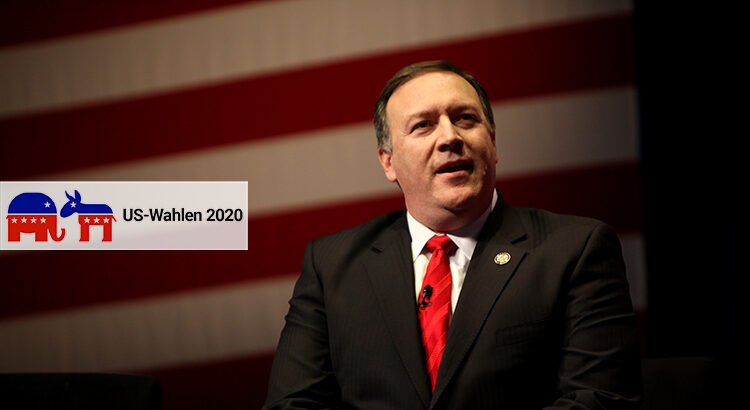In its last months in office, the Trump administration published a new, comprehensive framework on China policy. Despite the upcoming change in government, this report is notable for introducing a very ideology-centered perspective and rhetoric reminiscent of the Cold War. It could therefore provide a glimpse on how Republicans will approach China policy in opposition and exert pressure on the new government to stick with the confrontative course taken by Trump.
On November 18th, the US State Department released a long-form report entitled “Elements of the China challenge”, intended to offer a framework for how America should handle its looming great-power competition with Beijing. So far, it has drawn curiously little notice, considering the importance of the subject and the report’s self-professed claim to continuing the legacy of George Kennan’s famous 1946 “long telegram”, a document that deeply shaped US perceptions of the Soviet Union and provided a blueprint for containment policy.
Since the Trump administration is on its way out and will not be able to implement this framework, it would be easy to dismiss it as a parting shot in its years-long confrontation with China. Nevertheless, this document is highly relevant for two reasons: first, it draws a sharp ideological contrast between both countries, and sees them at the forefront of a renewed Cold-War-like clash between „free“ and „socialist“ world orders. This is a very uncommon frame especially for a policy document emanating from a diplomatic agency.
Second, this perspective on the US-China relationship is likely rooted in specific Republican perceptions of China that will remain relevant even under the Biden administration. Depending on the outcome of two run-off elections in Georgia, Republicans are likely to retain a very narrow majority in the Senate, and thus an influential voice in US foreign policy. Outgoing secretary of state Mike Pompeo is a plausible candidate for the 2024 presidential elections, as are prominent congressional China hawks like Marco Rubio, Tom Cotton and Lindsey Graham.
From engagement to ideological confrontation
The paper begins with an argument nowadays frequently heard in Washington: engagement policy is no longer viable because it failed to effect meaningful political and economic liberalization in China, and ultimately enabled it to issue a powerful challenge to the US-sponsored global order (p. 5). This assessment is hard to argue with in the Xi Jinping era. However, it overstates the scope of this challenge – which is selective rather than fundamental – and ignores the likelihood that shutting China out of the global order would have triggered even greater resentment.
The bulk of the report is made up of two parts, a description of Chinese conduct at home and abroad, and an analysis of the motivations and alleged ultimate goals behind it. The former recounts how Chinese influence is unfolding across the world, highlighting many areas of genuine concern, like denial of market access to silence criticism, unfair trade practices and cyberwarfare. This is largely in keeping with conventional analysis on the subject, although the report explicitly seeks to distance itself from it by arguing that Beijing’s actions are not just great power politics as usual, but a fundamental challenge to the US-led world order (p. 5-6).
In the second part, the report introduces a more novel, but also far more controversial argument that deserves greater scrutiny. This section shifts its focus from the economic and military hardware now at Beijing’s disposal towards the ideological “software” on which the Chinese Communist Party (CCP) is running. According to the paper, evidence of the CCP’s vision for a new, fundamentally different world order can be found in its specific fusion of communist and nationalist ideology (p. 28).
As for the former, the authors make much of the CCP’s rhetorical commitments to Marxist thought, arguing that “central to the CCP’s understanding of world affairs is the Marxist teaching that throughout history human societies have been divided into an oppressed class and an oppressor class” (p. 31). This supposedly commits the CCP not just to domestic revolution, but to overthrowing the entire capitalist world order in the interest of the oppressed classes (p. 32, 38). This entire section, which is mainly based on a single analyst’s interpretation of CCP ideology, badly misses the kind of Marxist thought that is currently shaping it and Chinese agency on the world stage. Class-based thinking has long been replaced with a single-minded pursuit of development and stability. The main Marxist remnants are beliefs in economic determinism and linear historic progression, theoretical knowledge that supposedly endows the party with a unique ability to scientifically guide China on its path to “rejuvenation”.
These subtleties are however lost in the State Department’s analysis. In the entire section, “Marxism-Leninism”, „communism“ and „socialism“ are used interchangeably, never defining what they actually mean in the Chinese usage. The main feature of contemporary Chinese “socialism” is a one-party state that does not tolerate rival power centers and thus seeks political control over, but not complete ownership of, the means of production. The greatest concern with the CCP’s worldview is its claim to limitless political control, which does not stop at China’s borders – and is, in fact, often exercised abroad by making use of the capitalist global economy and the power imbalances it creates.
A „socialist world order“ under Chinese rule?
The paper makes even more of the supposed CCP project to build a “socialist world order” and “instituting socialism globally”, but refrains from describing what this might look like in practice. Readers are obviously expected to interpret it as a repeat of the Soviet challenge during the Cold War, a parallel that is eventually made explicit (p. 45). This misses several crucial and obvious differences, including the facts that a) reform-era China has never exhibited much desire to export its political system, and its propaganda continues to stress the narrative of Chinese uniqueness; b) its ongoing development and growing international role are predicated on the selective appropriation of capitalist practices; and c) China’s claim to world leadership mainly revolves around its identity as a „large developing country“ rather than a socialist one.
In fact, actual Chinese behavior on the world stage can be much more readily explained by its quest for international status and re-gaining a perceived historical centrality – a world order that is not socialist, but Sinocentric. The paper also discusses this strand of thought, but conflates it with the narrower issue of Chinese nationalism. This leads it to underestimate how enormously appealing China’s growing clout is to its citizens, including many who are not fervently committed to communism or nationalism. Status, in addition to growing living standards, is the main output the CCP now uses to uphold its domestic legitimacy, which also makes it much more resilient to economic headwinds than the paper assumes (p. 40-42).
When it comes to the ideological dimension, the Chinese world order project is mainly a negative, subtractive one: ridding the liberal world order of its ability to exercise normative pressure on illiberal regimes; or, as Jessica Chen Weiss pithily put it, creating a “world safe for autocracy”. In this, China can draw on a potential coalition that is far broader than the tiny universe of socialist states, including illiberal democracies, personal dictatorships, absolutist monarchies, theocracies and ideologically agnostic developmental states. Here, too, mislabeling China’s vision risks underestimating its appeal and thus the challenge it poses to liberal norms.
A foreign policy strategy or a blueprint for domestic campaigns?
The paper closes with a set of policy prescriptions that are for the most part conventional and formulaic, like strengthening US institutions, safeguarding military and technological superiority, and building coalitions with like-minded states. Others, however, read like a call for ideological mobilization, specifically the charge that “sinister efforts from abroad seek to sow discord in the United States, and America’s grade schools, middle schools, high schools, and colleges and universities have to a dismaying degree abandoned well-rounded presentations of America’s founding ideas and constitutional traditions in favor of propaganda aimed at vilifying the nation” (p. 49). The appearance of such McCarthyist language in a piece that rightfully criticizes Beijing for attempting to stop the spread of liberal ideas in its own education system is as incongruent as it is alarming.
In general, the paper’s framing of a global ideological struggle between “socialism” and “freedom” seems reflective of current ideological divisions in US society, but these will also shape the debate over China policy under the Biden administration. Early indications of Team Biden’s future approach point to a greater focus on specific issue areas and willingness to explore compromise in at least some of them. However, if this paper is any indication, even such a relatively subtle shift is likely to come under fire from Republicans painting China as an implacable foreign enemy. If so, we are likely to see a sharp focus on supposed fundamental ideological incompatibility, challenges against any kind of re-engagement, and charges of betrayal levered against politicians willing to explore compromises. That, however, amounts more to tilting at ideological windmills than effectively dealing with the challenges China’s rise poses to the liberal world order.


